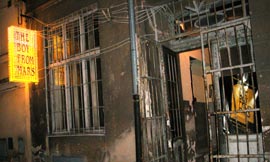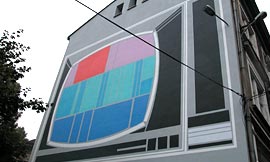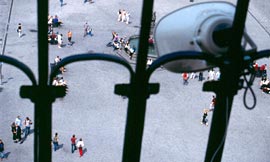|
|


(english Version only)
The "action" that the Foksal Gallery Foundation presents comprises loosely connected episodes and motifs, devoid of epic flourish while closely related to architecture and the art of the socially involved documentary. We attach a lot of attention to the seemingly secondary elements of "movie" production, i.e. soundtrack, the extras, the setting, and so on. Robert Musil, from whose "Man Without Qualities" we have borrowed the project's title, wrote about the flight from the "horrifying violence of repetition." We are therefore abandoning the exhibition medium and proposing to turn towards other ways of presentation and artistic activity. In Musil's novel, "parallel action" was a mega-plan, a synthesis of knowledge and skill, that comes apart because of a lack of an underlying idea and ends in a completely unexpected way. For us, the reference to the decadent fin de siécle is an expression of an attitude quite characteristic for today's socially involved artists: the relinquishment of positivistic control of perception, desires, and thoughts. Artists' actions join accidental courses of events, comment on, or build the awareness of, various developments, rarely changing their course. During this year's festival, we have decided to test such varied strategies directly on the town's living tissue. The methods employed by the artists, we have invited to take part often refer to "post-production," which is a technical term from the film and TV production vocabulary.

It describes the production phase during which the material previously shot is edited and assembled into a final movie. Post-production is a series of small, usually unspectacular procedures: editing, adding the final credits, voice dubbing, and so on. Post-production is usually done by a team of professionals who have not participated in the shooting of the movie itself: their job is to create extra value on the basis of what they have received. This is a moment when the registered picture can be transformed to convey meanings not necessarily identical with those originally intended.
In the late 90s, post-production became a metaphor of cultural activity as a whole, and artistic production in particular. Artists have been increasingly involved in recycling existing ideas or works, editing found or, not always legally, borrowed material. This attitude has given rise to a wide array of artistic strategies that are no longer focused on producing objects or creating exhibitions, but rather on shifting meanings in existing areas such as the economy, design, or architecture. As a result, artists have become increasingly interested in, for instance, local communities, economic conditions, or the specificity of places. At the same time, the line between production and consumption, as well as between creation and copying, has become blurred. Projects assume unspectacular form, and no longer follow the logic of a spectacle with its focus on the climax point. Instead, artists have been focusing on the long-term "side effect." One of the main consequences of such an attitude is usually a revealing or strengthening of social ties and relationships. Post-production artists go towards today's typical need for filling gaps in life's mechanical organization with meaning. Their activities are devoid of the "compulsion" of efficiency. "Even if these projects were not continued, and thus failed as 'social service,' that'd still probably be an artistic success."
The curatorial team
Datum: 22. Juli - 1. August 2004 im Rahmen des Filmfestivals "Era Nowe Horyzonty" in Cieszyn
Ort: Cieszyn
Projektpartner: 4. Filmfestival "Era Nowe Horyzonty", Gutek Film
Ort: Cieszyn
Projektpartner: 4. Filmfestival "Era Nowe Horyzonty", Gutek Film
Teilnehmende KünstlerInnen:
Superflex, François Roche, Philippe Parreno, Wojtek Kucharczyk & mik.musik & Felix Kubin, hobbypopMUSEUM, "Relax just do it", Monika Sosnowska, Michał BudnyKuratorInnen:
Joanna Mytkowska, Andrzej Przywara, Sebastian CichockiSpezialprojekte:
"Relax just do it" Michał Woliński